C. cass., Soc. Oct. 9, 2024, no. 23-14.585 (Unpublished)
In a ruling dated October 9, 2024, the French Supreme Court (Cour de cassation) reiterated that any irregularity in the conduct of professional elections is not such as to lead to their annulment.
In this case, a trade union and an elected member of the works Council (Comité Social et Economique – CSE) brought an action before the court for annulment of the second round of professional elections for the first “employees/workers” college.
When the ballot boxes were counted, it was found that the number of envelopes counted corresponded to the number of voters (76 envelopes). However, the polling station counted 79 valid votes and 1 invalid ballot, i.e. more than the number of envelopes.
In support of its claim, the union and the elected member of the works Council argue that the counting of ballot papers in excess of the number of votes cast and the failure to specify in the election minutes the origin of the surplus ballot papers constitute an irregularity likely to affect the sincerity of the electoral process.
The court dismissed the case against the trade union organization and the elected member of the works Council on the grounds that the counting of four additional ballots had no impact on the result of the second-round elections for the first college.
The Court of Cassation rejected the appeal formed by the trade union and the elected member of the works Council, stating that “it was in the exercise of its sovereign power of assessment that the court considered that the existence of irregularities having an impact on the outcome of the ballot had not been characterized”. Thus, in this case, the High Court considered that the assessment of the consequences of the irregularity on the result of the ballot was a pure question of fact, falling within the sovereign discretion of the trial judges.
Consequently, the Cour de cassation refused to uphold the request to annul the second round of elections, since the irregularity had had no impact on the outcome of the elections.
In practice, an election may be annulled in the event of an irregularity affecting a general principle of electoral law, exerting an influence on the election results, or if it was a determining factor in the representative status of the company’s trade union organizations (Cass. soc., Sept. 30, 2015, no. 14-25.925; Cass. soc., Dec. 17, 2014, no. 14-12.401; Cass. soc., Apr. 21, 2022, no. 20-23.225).



